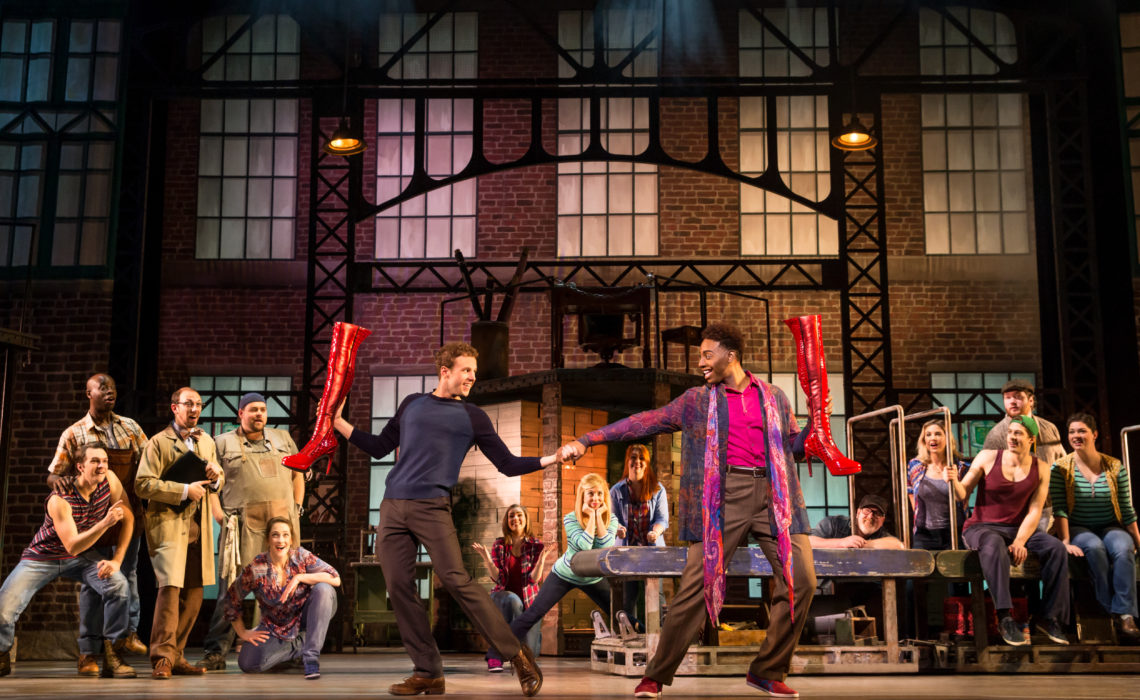Amid the constant barrage of Shreks, Legally Blondes, and Beauty and the Beasts that keep making the rounds in Ventura County theater, we were really looking forward to seeing Kinky Boots, a show we hadn’t seen before, and one that swept through the 2013 Tony Awards, winning six, including Best Musical. But despite all of its sequins, high-stepping drag queens, and rolling conveyor belts, there’s less to Kinky Boots than meets the eye. Troika Entertainment’s national tour, marketed by Theater League, is making a quick four-day stop at the Kavli Theatre in Thousand Oaks this weekend, and although the production features a plethora of impressive talent, the show itself is formulaic and predictable, somewhat less than its high-kicking reputation predicted.
Don’t get me wrong; Cyndi Lauper’s award-winning score definitely deserved its accolades and includes some real gems, while the performances by the show’s lead actors are terrific, but the show itself looks as if it had been abandoned halfway through due to lack of interest. After a promising first act, Kinky Boots devolves into just another heavy-handed morality play about accepting people for “who they are” (but as Seinfeld might have added: “not that there’s anything wrong with that”).
Charlie Price is the fourth scion of Price and Sons, a shoe factory in the working class community of Northampton, England that has fallen on hard times. When his father dies, Charlie wants nothing to do with his failing business and is urged by his materialistic girlfriend to turn the factory into condos and flee to London. But a chance run-in with an audacious female impersonator named Lola convinces him to tough it out, as the two become unlikely partners in a campaign to manufacture and market sturdy footwear for drag queens. As ridiculous as this premise might sound (how big a market could there actually be for such a product?), it’s all the show has to hang its hat on, and the audience has to suspend a lot of disbelief to go along with it.
Kinky Boots was written by Harvey Fierstein, who excels in stories that include transvestites or cross-dressing. (Fierstein also wrote Torch Song Trilogy and La Cage Aux Folles, both of which featured actors dressing up as women, and appeared in Hairspray, in which he donned a dress to play frumpy housewife Edna Turnblad.)
It helps that Lance Bordelon is a charismatic ball of kinetic energy as Charlie, darting back and forth, climbing the scaffolding to his second floor office, and acting like every employee’s micromanaging nightmare. To save their meager jobs, Charlie’s loyal workers go along with his nutty scheme, even when Lola takes over and begins to second-guess every decision Charlie makes.
Lola is played by the terrific Jos N. Banks, who is made up to look like Dennis Rodman at a Mardi Gras celebration. Despite their apparent differences, Fierstein’s script links Charlie and Lola through their respective troubles with their disapproving fathers, with both feeling they have to assert their individuality. “Be yourself. Everyone else is taken,” says Lola, quoting Oscar Wilde. Both Bordelon and Banks use energetic charisma to make their characters believable, and both are standouts.
Sydney Patrick plays spitfire factory worker Lauren, who has a secret crush on Charlie, but her character is underdeveloped, and she really doesn’t show more than solitary mooning over him until midway through Act II. It’s too bad, because the five-foot tall actress gives an outstanding performance, delivering the most unlikely of torch songs, the feisty “The History of Wrong Guys,” with verve and attitude, in which she tries to fight off her attraction to the already attached Charlie.
Adam du Plessis does well as Don, a boorish factory worker (a backwards baseball cap usually does the trick) whose masculinity is threatened by Lola. Ethan Kirschbaum has some nice moments as the prissy factory manager George while Hayley Lampart is properly snooty as Charlie’s girlfriend Nicola. Lola’s “Angels,” an ensemble consisting of six lanky males ostentatiously dressed as women, strut with calisthenic precision in their muscular production numbers. But other than Charlie and Lola, none of the other characters are developed beyond being two-dimensional stereotypes.
Act I takes 90 minutes to do what could have been accomplished in ten: Charlie’s father dies, Charlie takes over the factory, runs into Lola, and designs a pair of ridiculous two-and-a-half foot high red boots. Act I ends with a bang with the gimmicky-but-fun production number “Everybody Say Yeah,” in which the choreography includes dancing on moving conveyor belts. But Fierstein appeared to be at a loss with what to do in Act II, which centers on a ridiculous boxing match that is supposed to prove that Lola is a “regular guy” underneath all the makeup. There’s lots of soul searching and male bonding in Act II with the only unexpected revelation being that Lola is not gay and, despite dressing as a woman, is still attracted to them. Lola is quite an interesting character, however, who Banks plays with sincerity and the message about transcending stereotypes hits home, but it’s not enough to save what remains a generally lackluster conclusion to the story.
Cyndi Lauper’s well-crafted songs, performed by a juiced-up six-piece band (the juice is supplied by synthesizer programming), help save the show. Lauper’s songs are far from an example of a pop singer trying to write songs for Broadway. Some, such as “Take What You Got” and “Not My Father’s Sons” are actually great pop songs that help propel the story (Whatever happened to Broadway songs becoming pop hits, anyway?). Maybe the best of all “Sex Is In the Heel,” the production’s show stopping production number. But despite all this, there’s nothing really sexy about Kinky Boots that you’d want to hide your kids’ eyes from and the made-for-Broadway denouement is decidedly contrived and unconvincing.
In the 2013 Tony Awards, Kinky Boots won Best Musical in a decidedly thin roster of challengers, defeating such middling shows as Bring It On, A Christmas Story, and Matilda. In spite of its formulaic storyline, Kinky Boots is still a kick to see, thanks to some winning performances and Lauper’s attractive score.
*********************
Kinky Boots plays through February 25 at the Fred Kavli Theatre in Thousand Oaks.






No Comments